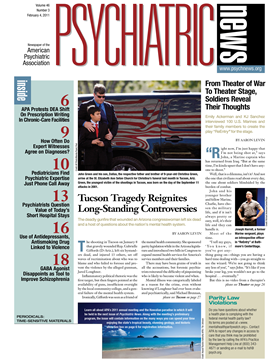Why are certain people more upbeat—that is, less susceptible to depression and anxiety—than others are? It has been suggested that the long (L) variant of the serotonin transporter gene—the 5-HTTLPR gene—might be one reason. For example, the L variant had been linked with less depression in the presence of stressful events.
But now it looks as if a particular variant of the oxytocin receptor gene—the T variant—might be another reason, German researchers reported online December 24, 2010, in Biological Psychiatry. The lead investigator was Christian Montag, Ph.D., of the University of Bonn.
The study sample consisted of 750 students at two German universities—the University of Bonn and the University of Heidelberg. Subjects were evaluated to see whether they possessed an SS variant of the serotonin transporter gene, an SL variant of the gene, or an LL variant of the gene.
They were also evaluated to see whether they possessed a CC variant of the oxytocin receptor gene, a CT variant of the gene, or a TT variant of the gene.
In addition, researchers used the Affective Neuroscience Personality Scale to assess subjects' personality dimensions of sadness and fear.
Since the T variant of the oxytocin receptor gene had been linked by the researchers in an unpublished study with greater trust, and since an inverse relationship between trust and anxiety had been found in another study, Montag and his team hypothesized that subjects having the LL variant of the serotonin transporter gene plus the TT variant of the oxytocin receptor gene would have the lowest sadness and fear scores.
Their results confirmed their hypothesis. The lowest sadness and fear scores were found in subjects having two L copies of the serotonin transporter gene plus two T copies of the oxytocin receptor gene. Those having other variant combinations scored higher on sadness and fear.
Previous studies of oxytocin have found that it has some antianxiety properties as well as some pro-social ones such as enhancement of social interactions, formation of human attachments, and increased trust (Psychiatric News, November 21, 2008), but not antidepressive properties.
The researchers anticipate that at some future point, not only the SSRI antidepressants, but oxytocin might be used to treat a wide array of psychiatric disorders depending on people's particular genetic constellations for serotonin and oxytocin in the brain.
Indeed, oxytocin or its analogs thereof, are already being tested to see whether they might have value as antianxiety or social-promoting medications—for instance, whether they might be able to attenuate fear in people with social anxiety disorder or generalized anxiety disorder, or whether they might be able to correct the social deficits experienced by people with autism spectrum disorders or schizophrenia (Psychiatric News, November 21, 2008).
The study was funded by the German Research Association.
